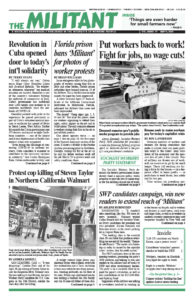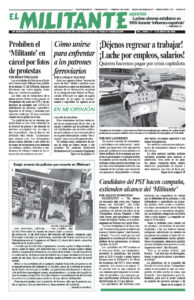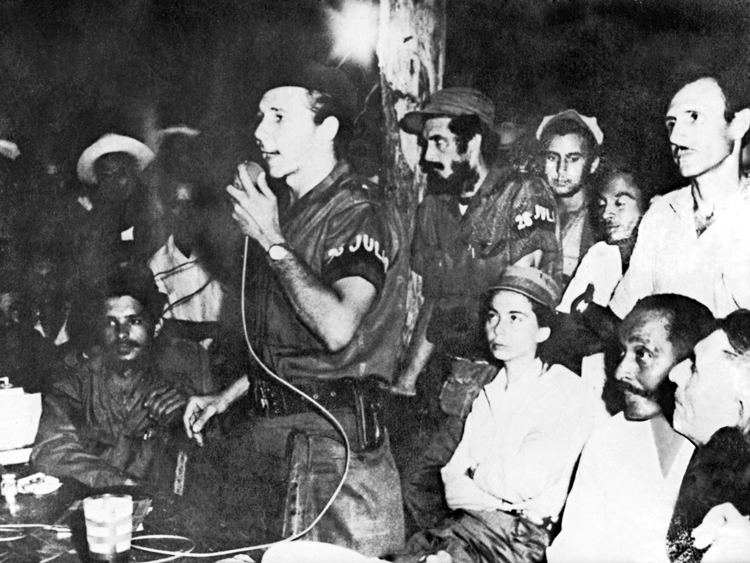Episodes of the Cuban Revolutionary War 1956-58 by Ernesto Che Guevara is one of Pathfinder’s Books of the Month for April. Argentinian-born Guevara joined and fought alongside Fidel Castro, becoming an outstanding leader of the Cuban Revolution that defeated the U.S.-backed dictatorship of Fulgencio Batista in 1959. In this book Che gives a firsthand account of the military battles and political advances that he participated in with the Rebel Army and explains how “the war revolutionized us.” It is one of the best accounts of how Cuba’s workers and farmers made their revolution, which is an example for working people throughout the world. The excerpts below are “From Batista’s Final Offensive to the Battle of Santa Clara,” and “Military Order No. 1.” Copyright © 1996 by Pathfinder Press. Reprinted by permission.
The news reports were contradictory and extraordinary: Batista had fled that day, leaving the armed forces high command in a shambles. Our two delegates established radio contact with [Gen. Eulogio] Cantillo, telling him of the surrender offer. But he refused to go along because this constituted an ultimatum, and he had taken over command of the army in strict accordance with instructions from the leader Fidel Castro. We immediately contacted Fidel, telling him the news, but giving our opinion of Cantillo’s treacherous attitude, an opinion he absolutely agreed with. (In those decisive hours, Cantillo let all the main figures in Batista’s government flee. His attitude was even worse, if one considers that he was an officer who had made contact with us and whom we had trusted as a military man of honor.)
The results that followed are known to everyone: Castro’s refusal to recognize Cantillo’s authority; Fidel’s order to march on the city of Havana [accompanied by his call for a nationwide general strike]; Colonel Barquín’s taking over command of the army after leaving the Isle of Pines prison; the seizure of Camp Columbia by Camilo Cienfuegos and of La Cabaña fortress by our Column no. 8; and finally, a number of days later, the installing of Fidel Castro as prime minister of the provisional government. All that belongs to the country’s present political history.
We are now in a position in which we are much more than simple factors of one nation. We are now the hope of the unredeemed Americas. All eyes — those of the great oppressors and those of the hopeful — are firmly on us. In great measure, the development of the popular movements in Latin America depends on the future stance that we take, on our capacity to resolve many problems. And every step we take is being observed by the ever-watchful eyes of the big creditor [U.S. imperialism] and by the optimistic eyes of our brothers and sisters in Latin America.
With our feet planted firmly on the ground, we are beginning to labor and produce our first revolutionary works, confronting the first difficulties. But what is Cuba’s main problem if not the same as of all Latin America, the same as even enormous Brazil with its millions of square kilometers and with its land of marvels that is a whole continent? The one-crop economy. In Cuba, we are slaves to sugarcane, the umbilical cord that binds us to the large northern market. We must diversify our agricultural production, stimulate industry. And we must ensure that our minerals and agricultural products, and — in the near future — our industrial products go to the markets that are best suited for us and by means of our own transport lines.
The government’s first great battle will be the agrarian reform, which will be audacious, thorough, but flexible: it will destroy the landed estates in Cuba, although not Cuba’s means of production. It will be a battle that will absorb a great part of the strength of the people and the government during the coming years. The land will be given to the peasant free of charge. Landowners who prove that they came by their holdings honestly will be compensated with long-term bonds. But the peasantry will also be given technical assistance; there will be guaranteed markets for the products of the soil. And production will be channeled with a broad national sense of development in conjunction with the great battle for agrarian reform, so that within a short time the infant Cuban industries can compete with the monstrous ones of the countries where capitalism has reached its highest level of development. Simultaneously with the creation of the new domestic market that the agrarian reform will bring about, and the distribution of new products to satisfy a growing market, there will arise the need to export some products and to have the adequate instrument to take them to this or that part of the world. …
With those elementary weapons, we Cubans will begin the struggle for our territory’s total freedom. We all know it will not be easy, but we are all aware of the enormous historic responsibility of the July 26 Movement, of the Cuban revolution, of the nation in general, to be an example for all peoples of Latin America, whom we must not disappoint.
Our friends of the indomitable continent can be sure that, if need be, we will struggle no matter what the economic consequence of our acts may be.
❖
In this territory an official land register will immediately be undertaken in order to begin the distribution of land to the peasantry of the region. As of this moment, all property, both fixed and movable, belonging to servants of the dictatorship is declared confiscated, regardless of how it may have been obtained. The sole exception will be those small proprietors who are able to demonstrate that they have family responsibilities and hold no other possessions in any part of the republic. All properties greater than 30 caballerías [1,000 acres] that are not devoted to intensive agricultural cultivation or animal husbandry are to be subject to investigation by the Agrarian Reform Commission of our Revolutionary Army. Every peasant who for at least two years has been paying rent, either in cash or in kind, for working a parcel of land in the territory covered by this military order is hereby declared free of all payment obligations and is invited to claim his rights over the land he works.


